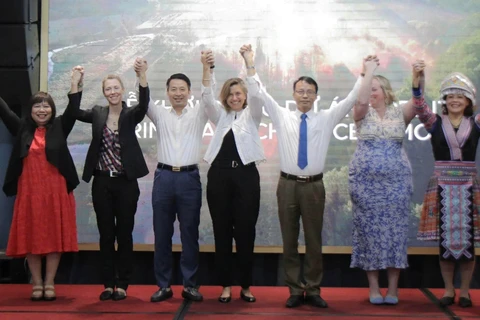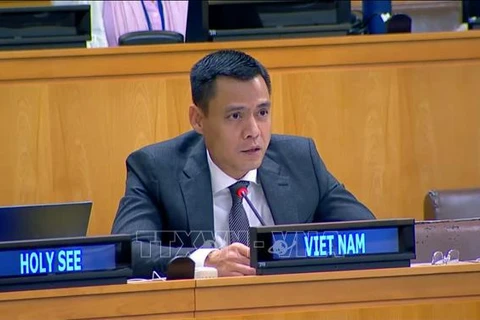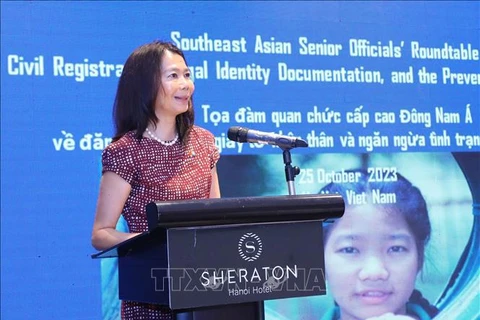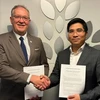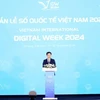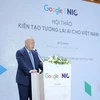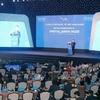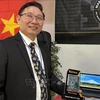Hanoi (VNA) - “Before this course, I had no idea how to challenge gender norms and stereotypes. Now, I have learned practical skills that help make my family members equal and able to work together to improve our income—something I never thought was possible before”, Lo Thi Tien, an ethnic minority woman from a remote village in Dien Bien province, shared her experience in a micro-certificate course on gender equality and household economic development.
"This course opened my eyes. I learned how important it is to speak up and protect ourselves and each other. Now, I feel confident enough to start a group at my school where we can discuss ways to support and protect one another and raise awareness about children's rights", Su, a junior high school student from Sapa town, Lao Cai province, said after attending a training on child protection.
These are just two examples of the numerous positive reviews received about short-training courses.

So, what is the concept of “micro-credentials”?
Micro-credentials are a new concept in the education, training and human resource development system, complementing the existing concept of macro-credentials in many countries around the world, including Viet Nam.
In 2022, UNESCO introduced the concepts of credentials, micro-credentials, and macro-credentials. Accordingly, credentials verify, validate, confirm, or corroborate a person’s learning achievements, knowledge and preparedness for performing tasks. Credentials are diverse with regard to their scope, status and purpose. A large subset of credentials can be referred to as macro-credentials: generally, these include degrees, diplomas, certificates and licenses, often awarded by accredited, recognized or regulated educational and other institutions or organizations. They indicate learning achievement of a broad body of knowledge, transferable skills or technical proficiency and may take a number of years to complete. Another large subset of credentials can be referred to as micro-credentials: these are typically focused on a specific set of learning outcomes in a narrow field of learning and achieved over a shorter period of time. Micro-credentials are offered by commercial entities, private providers and professional bodies, traditional education and training providers, community organizations and other types of organizations.
In the Bangkok Declaration 2022 of Ministers of Education in the Asia-Pacific also mentioned the role of micro-credential as one of the solutions to transform education in the coming years: “Establishing flexible learning pathways with multiple re-entry points at all ages and educational levels, and the recognition and accreditation and validation of alternative education, in particular for out-of-school children, adolescents, and adults, recognizing qualifications earned through online and blended learning through micro-credentials and providing opportunities for re-skilling and upskilling in a lifelong learning perspective”
In Vietnam, existing laws, including the Education Law, the Law on Higher Education, and the Law on Vocational Education, provide only general regulations on traditional credentials, with no specific guidelines for micro-credentials or transitions from certificates to micro-credentials. However, the 2021 Project "Building a Learning Society for 2021-2030" introduced by the Prime Minister set a goal to establish an inclusive, diverse, flexible, and interconnected education system by 2030. This project proposes reviewing and refining regulations on assessment and recognition of continuing education, integrating formal and continuing education systems, and correlating various educational levels—a step toward enhancing Vietnam's credential system, including micro-credentials, to meet the demands of the Fourth Industrial Revolution and international integration.
The experience of VSF…
For Vietnamese Stature Foundation (VSF) is a social, non-profit organization licensed by Vietnam’s Ministry of Home Affairs to operate nationwide since 2014, dedicated to advancing the Sustainable Development Goals (SDGs). Over the past decade, VSF has led efforts in providing accessible education through its innovative short-term training programs. These short-term training programs are the micro-credentials that VSF offers, providing practical, skills-based education that directly meets the needs of the communities it serves.

As micro-credentials gain momentum globally, VSF has developed a unique model that emphasizes not only market relevance but also social impact. By tailoring training programs to meet the specific needs of communities, especially those in remote and underserved areas, VSF has made a tangible difference for individuals who face challenges in accessing formal education and skill-building opportunities.
"Skills and knowledge training, even in a short format, has the power to transform lives and uplift communities. When thoughtfully designed around the unique needs and aspirations of those we serve, it fosters resilience, opens new doors, and lays the foundation for sustainable growth," expressed Tran Hong Diep, Director of VSF.
One of VSF's core commitments is to reach the most vulnerable communities, including ethnic minorities, women, youth, and people in underserved areas. Through its micro-credential programs, VSF provides training that is accessible, practical, and directly relevant to their needs, covering vital topics such as healthcare, school nutrition, child protection, gender equality, vocational skills, and environmental protection.
Community capacity-building activities are a central component of all VSF's programs and projects, aimed at fostering positive changes in the awareness and behavior of beneficiaries and stakeholders. On average, VSF conducts approximately thirty training courses annually, each lasting between one and three days. The participants are diverse and include youth and children from local communities, students from universities and schools, ethnic minority women, caregivers, teachers, as well as policy planners and implementers.
To plan and design community training courses, VSF uses a “Results Chain” model, which defines the desired positive changes at various levels: input, activity, output, outcome, and impact. The model reflects the change process, starting from resources invested (input) through specific actions (activities), leading to tangible products (outputs), then medium-to-long behavioral changes (outcomes), and finally, broad, lasting impacts on society (impact).
VSF also applies Kolb’s Experiential Learning Model (1984), which includes three phases: Experience, Reflection, and Application. In the Experience phase, participants engage in activities designed specifically for each course. The Reflection phase involves analyzing the experience and discussing the lessons learned, while the Application phase encourages participants to apply the new knowledge in their daily lives.

Looking ahead, VSF plans to strengthen and expand its micro-credential initiatives to address the educational needs of underserved communities in Vietnam. Over the next decade, VSF will focus on strategic goals based on a thorough analysis of its strengths, weaknesses, opportunities, and challenges.
Enhancing partnerships and technology integration
A key priority for VSF is building strong partnerships with academic institutions, businesses, and government agencies to ensure the recognition and value of its micro-credentials. Additionally, VSF will invest in digital platforms to enhance course accessibility, verify credentials securely, and expand the reach of its programs across Vietnam.
Commitment to equity and sustainability
VSF will focus on promoting inclusivity by empowering marginalized communities, such as ethnic minorities and women, through its micro-credential programs. This aligns with the demand for lifelong learning and supports social equity. Furthermore, VSF will tailor its training programs to align with global sustainability goals, ensuring that its programs remain relevant both locally and globally.

As for future directions, VSF Chairwoman Tran Thi Nhu Trang shared: “Despite the challenges, we are committed to enhancing the quality of our training in community development projects. We look forward to collaborating with both domestic and international educational institutions to provide the best training opportunities for our target groups. Our focus will continue to be on five main themes: school health, child protection, talent nurturing, gender equality and women’s protection, and environmental protection.”
